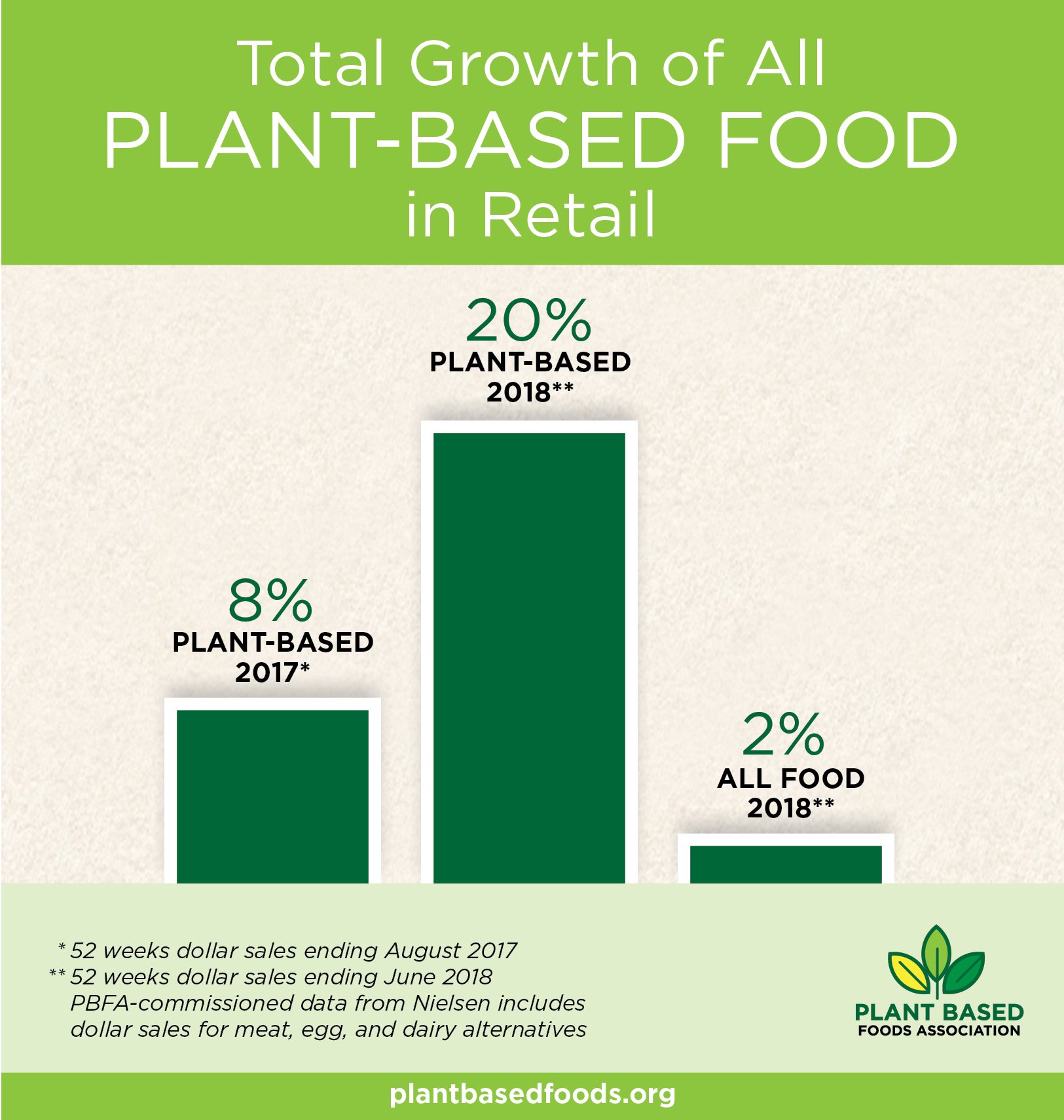Farm to Fork Column
By: Victor Martino
5 mega-trends farmers and agribusiness need to know about for 2019
Agriculture and the food industry have been undergoing significant change for the last decade. These changes are something farmers and others in the agribusiness industry need to be aware of from a business and supplier standpoint as 2018 comes to an end and we ring in the new year.
These are the 5 mega-trends I think should be on farmers’ and the agribusiness industry’s radar for 2019
- Plant-based, gluten-free and organic foods
Consumers in significant numbers are changing their eating habits. Plant-based foods, gluten-free and organic are the three fastest growing segments in the food industry today.
Almond milk as an example has seen a 250% increase in sales over the last decade. Today it’s considered a mainstream product in grocery stores. In fact, most major grocery chains even have their own brand (store brand) of almond milk today, which is only something grocers do when they believe a product has hit the mainstream.
In my analysis and opinion (and I do this for a living), plant-based foods and beverages are going to be the number one food trend in the U.S. in 2019, across the board, from veggie burgers and vegetable-based frozen food products, to milks made from oats, cashew nuts, sesame seeds, hemp (and of course almond and soy) and other plant-based crops.
Dairy milk sales are flat, largely because of the growing numbers of people who are buying and drinking these plant-based alternatives. I see no change in this trend in 2019.
Gluten free foods have seen the same meteoric rise in sales over the last 10 years as well.
A decade ago it was difficult to even find gluten-free food products in most supermarkets. In contrast, today there are numerous brands and products sporting the gluten-free label in nearly every aisle of the grocery store.
Most major food manufacturers produce gluten-free products, and there are so many startups focusing on gluten-free it’s difficult to keep track of how many actually exist.
The sales growth of organic foods has slowed slightly over the last couple years, from 10-12% annual growth to about 8% annual growth in 2017 and 2018. That’s still significant growth however. In contrast, the entire packaged food industry’s sales growth over the last two years is a mere 2% annually.
These shifts in consumer eating behavior and focus in the food industry are important for farmers and agribusiness to be aware of from a market standpoint.
For example, the hottest produce item in America today in terms of sales growth is Cauliflower. Consumers not only are devouring cauliflower in its fresh form but its inclusion in products like gluten-free pizza crust and ready-to-heat pizza’s, along with in products like Veggie Tots (veggie Tater Tots) and Cauliflower Rice, both of which are gluten-free, has created a true sales explosion that isn’t expected to slow down. In other words, it’s not a fad. Planting cauliflower, which is in high demand by food makers and consumers, is a solid, market-based move for those farmers who choose to do so.
Plant-based milks also will continue to boom. As such, increased demand for crops like almonds will be needed by manufacturers.

- Technology on the march
Technology is sweeping the food and grocery industries, as well as agriculture.
Robotics, artificial intelligence, predictive analytics and more are growing at warp speed.
For example, big food companies like ConAgra and Kraft-Heinz are using artificial intelligence and machine learning to help predict consumer buying behavior.
Walmart is using robots to clean the floors in some of its stores.
Amazon, Walmart, Target, Kroger Albertsons and nearly every other grocery chain are using technology to allow you to never set foot in a grocery store if you don’t want to, instead allowing shoppers to buy their groceries online and either have them delivered or pick them up at the store.
Amazon and others are also testing stores with automatic checkout — no more waiting in line. No more grocery checkers.
Further, startups like Analytical Flavor Systems are using artificial intelligence as a substitute for human tasters to help food companies create products that appeal to today’s new consumers, particularly Millennials and Generation Z, who prefer less processed foods with different taste profiles than baby boomers do.
Agtech, also called precision agriculture, is the biggest buzz word in agribusiness today. Robotic weeding machines, precision spraying rigs, apps that predict crop yields; these are just a few of the areas in which technologists are applying their knowledge and skills, backed by over $1 billion in venture capital funding, to farming.
Technology across the food chain, from the farm to food manufacturing and retailing, will grow even more in 2019 than it has in 2018. Farmers need to be aware of these developments because as suppliers to the food industry they’ll increasingly be called on to use more technological means to communicate with and deal with customers, along with the fact that as farmers these new technologies mean potential labor savings and higher productivity. The farm labor shortage, particularly in California, is also driving the advance of Agtech. It’s a huge part of the future of farming and the entire food industry.
- Traceability and blockchain
Consumers are increasingly wanting to know where the food they buy comes from, from the farm to the fork. It’s all part of the greater demand from food companies for transparency.
Key to this is traceability. Food companies are beginning to offer information to consumers via their websites and using QR Codes right on product packages that tells shoppers where the ingredients for a given product were grown, and who grew them, whether a family farmers, agribusiness giant or other.
Traceability also is a valuable tool in product recalls, which are on the increase. Knowing where a particular crop, say romaine lettuce, was grown helps the federal government and food companies rapidly determine the origin of a the particular crop responsible for the recall.
The tool of choice in the industry for traceability is blockchain, which is essentially a digital ledger and record of whatever data is added by its members. It’s a high-tech way to hold volumes of data and recall it when needed.
Farmers should prepare to provide information asked for by customers and brokers as it involves traceability because food companies are increasingly requiring it because a significant and growing percentage of consumers want it.
- Direct-to-consumer marketing and selling
Grocery stores and restaurants, split about 50-50, are still the places where the vast majority of U.S. consumers get the food they eat. But there’s a growing movement among retailers like Amazon and food companies large and small to get shoppers to bypass grocery stores and restaurants and get groceries and prepared foods delivered right to their homes. Grocery delivery, direct-to-consumer initiatives by food makers, and food delivery are three of the hottest areas in the food industry today.
Venture capital firms are investing are investing hundreds of millions of dollars in startups in these areas. The mission of these startups is to disrupt the traditional food distribution by going directly to consumers, eliminating the middle man, grocery stores and restaurants.
The direct-to-consumer market is a small one at present. But it’s big enough that huge food companies are also getting into it.
Many farmers have also started selling value-added goods they grow directly to consumers via websites and social media sites. It’s an area farmers should pay close attention to. It’s only going to grow larger. IT also offers an alternative to some farmers as part of their overall sales mix. The margins for goods like fresh fruit, nuts and other consumer-friendly crops are much higher than if sold to a wholesaler or directly to retailers. The challenges though are greater. Like anything, rewards come with risk.
- Politics and economics
The biggest wildcard for 2019 is politics and economics. The president is currently being investigated for a variety of things, from collusion with Russia in the 2016 election to tax fraud. Much uncertainty surrounds his presidency.
The Democrats will also take over the U.S. House of Representatives in 2019, which will significantly change the balance of power in our nation’s capital.
The president also has said he plans to continue with his trade war with China in 2019, which is something farmers and agribusiness are very concerned about.
On top of all this, many respected economists think the U.S. way be in for a recession in 2019.
I call politics and economics a wildcard because it’s something the food and farm communities have little to no control over. Despite this fact though we need to be prepared for the potential negative outcomes economically and politically 2019 might bring.
This factor is less a trend than it is a cautionary not. Ag industry trade groups need to look out for farmers particularly closely in 2019 because much is at stake.
Food and farming are America’s oldest industries. They also are its most vital and most productive. One thing we all need to do in 2019 is redouble our efforts to communicate to the country just how important these industries are.
Increased understanding of farming by consumers has never been more important than it is today.
Additionally, farmers and those in the food industry need to communicate more. Most food makers and retailers for example have little understanding of farming. Conversely most farmers have little understanding of how the food industry and grocery retailing work. For example, many farmers would be stunned to learn that grocery chains only make a 1% net margin on everything they sell. And most food company executives would be surprised to learn just what it takes to grow a crop of tomatoes that goes into the tomato ketchup they bottle and sell.
Here’s to a challenging, exciting and productive 2019. Happy New Year.

By Victor Martino

